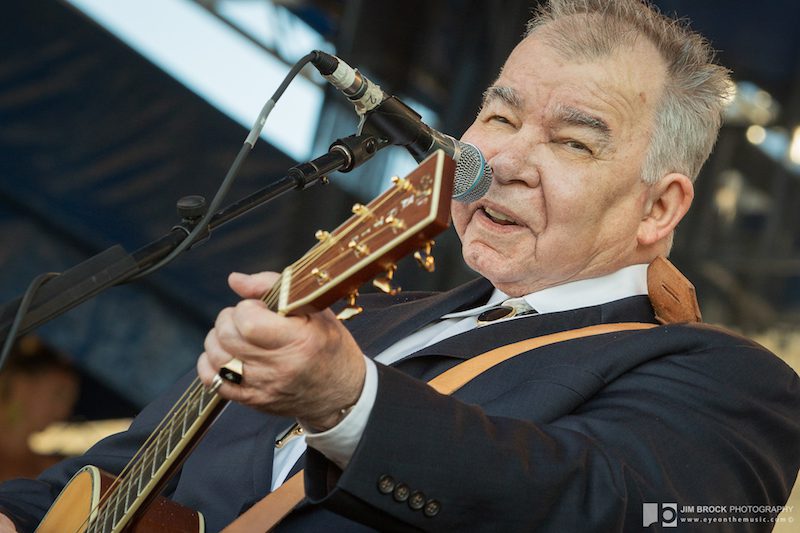THROUGH THE LENS: Remembering Roots Musicians We Lost in 2020

John Prine - Newport Folk Festival 2017 - Photo by Jim Brock
As hard as this past year was, it is with a heavy heart that the first Through the Lens column for 2021, a year that signals a new hope for us all, is one that remembers some of the significant roots artists who passed away during the needlessly deadly one just passed.
As nearly all of them rose to prominence during the 1970s, with their passing so much of an era is also slipping away. We will never see their like again.
David Olney, Jan. 18
I met Olney at a Townes Van Zandt gig in Athens, Georgia, in 1972. A few years later I brought him to my college coffeehouse, and last saw him at the 2018 AmericanaFest. He was a troubadour in the finest of traditions. Read former ND Editor Kim Ruehl’s thoughts on his passing on stage at the 30A Songwriters Festival here.
Bill Withers, March 30
While his roots-based soul songs were worldwide hits, his most loved song in his home state, West Virginia, is “Grandma’s Hands,” as it captures the importance of family in Appalachia. His 1973 live album at New York’s Carnegie Hall remains so significant that in 2015 Dr. John, Keb’ Mo’ and others performed the album song-for-song at that same venue. While he had stopped performing years before, Withers hosted several West Virginia Music Hall of Fall ceremonies. On his last visit in 2017 he finally performed again, playing the piano to an enraptured audience.
John Prine, April 7
When I reviewed his debut album in 1971, I noted that Prine was being touted as the next Dylan, but predicted it would not be long before everyone would want to be the next John Prine. He’s rightly been called the Godfather of Americana, and having been honored so many times by the Americana Music Association it should just go ahead and name the Artist of the Year award after him. Here’s the April 14, 2020, Lens column in which ND’s photographers share their memories of Prine.
Little Richard, May 9
As Grant Britt said in a 2015 box set review for ND, Little Richard is “[T]he originator, the agitator, the disturber, the upsetter, the architect, and the antichrist of rock and roll. There’s never been anybody or anything like him, before or since. Little Richard started something that nobody knew they needed ’til he created it, then found they couldn’t do without it. Others tried to usurp his raucous magnificence, but Little Richard Penniman did it faster, harder and raunchier than anybody else.”
Charlie Daniels, July 6
Like many of my contemporaries, I knew Daniels as a studio musician, but that changed when lyrics were added to the Vassar Clements tune “Lonesome Fiddle Blues,” turning it into “The Devil Went Down to Georgia.” In those heady 1970s days when all things were possible, including roots music being played on the radio, the song reached #3 on the Billboard chart. Here’s ND’s Henry Carrigan’s take on Daniels’ memoir.
Justin Townes Earle, Aug. 20
The A.E. Houseman poem “To an Athlete Dying Young” easily applies to artists dying young as well with its lines: “Eyes the shady night has shut / Cannot see the record cut / And silence sounds no worse than cheers / After earth has stopped the ears.” It certainly was not easy growing up an Earle, and perhaps the deepest cut was that he had seemingly turned his life around. Here’s ND Managing Editor Hilary Saunders piece on his passing.
Toots Hibbert, Sept. 11
In his Rise of Reggae and the Influence of Toots and the Maytals, Matthew Sherman said, “In the winter of 1968, the cool rocksteady beat gave way to a faster, brighter, more danceable sound. Reggae was born. Toots heralded the new sound with the seminal, complex groove monster ‘Do the Reggay’ advertising ‘the new dance, going around the town.’ Toots wanted ‘to do the Reggae, with you!’” For over 50 years we did the reggae with him. My last time was 2018.
Jerry Jeff Walker, Oct. 23
Walker was my gateway drug. He introduced me to David Bromberg (1969), Bromberg introduced me to Emmylou Harris (1970), then to Guy Clark and Ray Wylie Hubbard via his seminal 1973 live album ¡Viva Terlingua!, which remains one of the pillars of modern roots music. Here’s the obit from ND Assistant Editor Stacy Chandler.
Billy Joe Shaver, Oct. 28
An integral part of the Texas invasion, Shaver made his mark early when Waylon Jennings recorded an entire album of his songs in 1973, Honky Tonk Heroes, and was featured on the album’s cover along with Jennings and his band in a bar. Here’s the ND obit.
Charley Pride, Dec. 12
As ND’s Saunders noted in her obit, Pride had 52 Top 10 country hits and was RCA’s biggest-selling artist since Elvis. Awarded the coveted Entertainer of the Year award for 1971 by the Country Music Association, he was the first Black country music superstar. But there still remained that element of racism. In a story told by Loretta Lynn, who was to present the award to Pride, she was instructed by the CMA brass not to hug Pride as was the custom on awards shows. She told them that no one tells her what not to do, and so she did.
Rita Houston, Dec. 15
Perhaps not that well-known outside the New York area, Houston was, for 25 years, the Godmother of roots music radio in that most metropolitan of towns. While her many fans are a who’s who of modern roots music, many felt she was one of a kind. “She was a beacon in the dark continent of modern media,” said Jorma Kaukonen.
Tony Rice, Dec. 25
“Gone, like summer wages.” This lyric from the Ian Tyson song that I heard Rice sing so many times so many years ago was my first thought when I heard that he had passed. While my rock friends had their guitar god trios, mine were Doc, Clarence, and Tony. Here’s Stacy Chandler’s remembrance for ND.
Of course, the folks above are just 12 of the many musicians we lost in 2020. Here’s a more complete list and audio montage from NPR Music.
Now, the photos of the musicians mentioned above, many of which have not been published before.
- John Prine – Newport Folk Festival 2017 – Photo by Jim Brock
- Little Richard – Photo by Mary Andrews
- Justin Townes Earle – Hardly Strictly Bluegrass Festival 2017 – Photo by Peter Dervin
- John Prine – Photo by Tom Bush
- John Prine, Bonnie Raitt & Steve Goodman – Philadelphia Folk Festival 1972 – Photo by Steve Ramm
- John Prine- Hardly Strictly Bluegrass 2011 – Photo by Peter Dervin
- Jerry Jeff Walker – Photo by Kevin Smith
- Jerry Jeff Walker – The Ryman 2015 – Photo by Amos Perrine
- Jerry Jeff Walker – Photo by Kevin Smith
- Tony Rice – Backstage at MerleFest – Photo by Jim Gavenus
- Charley Pride – Photo by Mary Andrews
- Tony Rice – MerleFest 2011 – Photo by Amos Perrine
- John Prine – Newport Folk Festival – Photo by Anthony Mulcahy
- John Prine – Mountain Stage 1991 – Photo by Brian Blauser
- John Prine – Cayamo 2018 – Photo by Larry John Fowler
- Toots Hibbert – 2011 – Photo by C. Elliott
- Toots Hibbert – Finger Lakes GrassRoots Festival 2018 – Photo by Amos Perrine
- Toots Hibbert – 2011 – Photo by C. Elliott
- Tony Rice & Peter Rowan – MerleFest Photo by Jim Gavenus
- Tony Rice – IBMA 2013 – Photo by Todd Gunsher
- Tony Rice & Jerry Douglas – IBMA 2013 – Photo by Todd Gunsher
- Justin Townes Earle – Photo by Jim Gavenus
- Justin Townes Earle – World Cafe Live – Photo by Mark J. Smith
- Justin Townes Earle – 2017 – Photo by C. Elliott
- David Olney – AmericanaFest 2018 – Photo by Carol Graham
- David Olney – Southern Festival of Books – Photo by Chris Griffy
- David Olney – Photo by Peter Dervin
- Billy Joe Shaver – Photo by Mary Andrews
- Billy Joe Shaver – Photo by Peter Dervin
- Billy Joe Shaver – Photo by Mary Andrews
- Charlie Daniels – Photo by Mary Andrews
- Charlie Daniels – Photo by Jim Gavenus
- Charlie Daniels – Photo by C. Elliott
- Bill Withers – WVMHoF 2017 – Photo by Amos Perrine
- Rita Houston – WFUV – Photo by Lynda Shenkman
- Bill Withers – WVMHoF 2017 – Photo by Amos Perrine








































